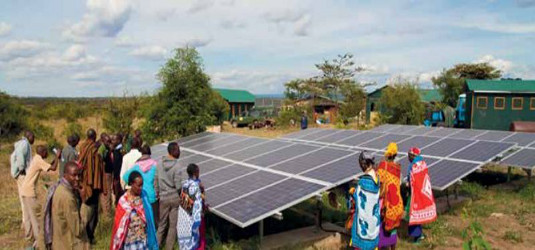Leverage the IRA for Global Clean Energy Leadership
David Williams & Daniel M Kammen
The Inflation Reduction Act (IRA) is a profound step in advancing climate leadership particularly from a deeply divided nation. Now is the time to show how this step leads to progress, profits and jobs where we are not divided: advancing US overseas engagement and climate leadership. To do, Congress could extend the IRA tax credits for US firms working internationally.
The US has much work at home to do to usher in the clean energy revolution. We need to act globally, however, or domestic progress will mean very little. We can achieve this by extending proven tax incentive tools to unlock the necessary investment across Africa, Asia and Latin America. This will build markets and create jobs for the clean energy sector in the US. Developers will have an entirely new pool of sophisticated investors and the capital necessary to match the scale of the climate challenges.
While many bemoan the dominant role China plays in investing in emerging economies, extending US tax credits for clean energy projects provides US companies a means to build markets and accelerate global decarbonization. Take a look at the opportunities in Africa.
The number of unelectrified Africans has remained nearly unchanged at over 600 million for over a decade, despite efforts aimed at achieving the UN Sustainable Development Goal (SDG7) to provide global energy access by 2030. At COP26 in Glasgow last November, the international community made a commitment of $100 billion to industrializing nations. This is an order of magnitude smaller than what is needed on an annual, ongoing, basis to build decarbonized, affordable, and resilient energy future. Clean energy is now cheaper to build and simply operate than existing fossil fuel projects. Africa needs massive and sustained financing for new, bankable projects.
The Africa electrification story is complex because ‘bankable’ projects are dependent not only on designing good projects but also on the twin constraints of sustaining capital from investors and then also able to navigate complex local regulatory issues. Sub-Saharan African projects are often held up because of a lack of ‘First loss capital’ (high risk) funding that leverages bank and central government investments.
Providing risk-tolerant ‘first-loss’ capital at scale leverages hundreds of billions in a global renewables industry. Operationally this could be done by extending the IRA to specific projects in Africa. This would strengthen investment by US firms and support the geopolitical goals of the US. This tax credit would afford the same incentives across to the border that already include investments in solar, wind, geothermal, sustainable hydropower, energy efficiency upgrades, and transmission and distribution projects.
Tax incentive investing works. The US Investment Tax Credit is responsible for the dramatic successes of solar across the US since its launch in the Energy Policy act of 2005. The program has been highly popular and an economic engine creating over 230,000 jobs in every state with an annual private investment of over $30 billion all while making renewable energy more affordable than conventional energy sources. The program has challenges but is resoundingly successful by relying on private companies to make good investments.
The economic needs for African energy are tremendous and aid is simply not enough. At COP26 the US and European Partners committed $7.5 billion in aid for the ailing South African energy sector. Nigeria has publicly stated a request for a comparable amount. These investments are critically needed to upgrade or build grid transmission assets, invest in new clean energy projects, reduce methane (CH4) fugitive emissions, invest in energy access, and launch electric vehicle markets. $400 billion are needed beyond business as usual for each country to achieve a clean energy transition. That is almost a trillion dollars of investment opportunity for US companies to support Just Energy Transitions in just two nations. Rewarding US companies for investing in commercial clean energy projects in Africa will enable a transition that cannot be achieved with public sector funds alone.
This can be launched quickly and can be in place soon after the November COP27 meeting in Egypt. The Institute on Taxation and Economic Polity found that at least 55 of the largest corporations in the US paid no federal corporate income taxes on their 2020 profits. Over $8 billion in avoided tax a year is in complex offshore structures. The tax incentive we propose correct this by providing the private sector a clear means to back up their public statements of commitment to a Just Energy Transition via direct investments in the neediest and fastest growing markets.
This ‘simple’ solution requires only a modest change to the US investment Tax Credit program to extend eligibility to certain international projects. The US direct aid and web of supporting wrap-around services certainly make a difference but are not enough. Extending proven US policy would be a significant catalyst for capital directed to industrializing energy markets. In the past year we have seen multi-billion-dollar investments in solar, storage, and electric vehicles in Angola, plans in Kenya to move from a 4 GW national grid to 100 GW by mid-century, and both Nigeria and South Africa commit to going carbon-free if investment flows to solar, wind, energy storage, electrified transportation, and green hydrogen. The markets are there, the time is now, and what is most needed is a means to move capital.
The world’s climate-vulnerable are susceptible to the impacts of climate change, and are the most affected by weaponizing energy. This is a unique moment where political will can bring incremental tax code changes that democratize, de-carbonizes, and decreases the conflict costs of energy around the world. This just might be the match that lights renewable solutions for the rest of the world.
